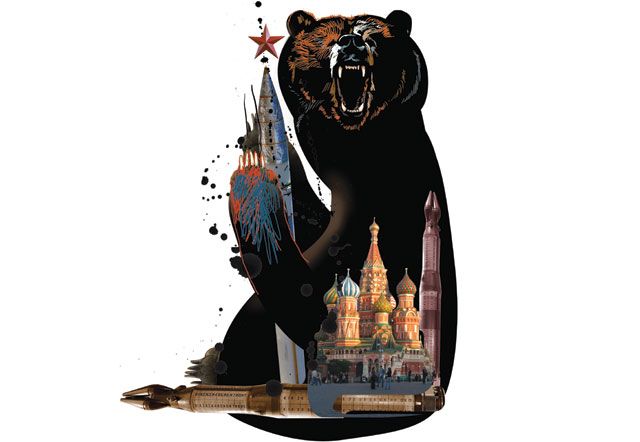Image is everything" might be a viable credo if you are the house of Gucci or a catwalk model, but it is definitely not appropriate as a national strategy. Yet "Putinism," the ruling ideology of the Russia that Vladimir Putin has forged during his 10 years in power, is all about image the image of a reconstituted great power restored to the world stage.
The problem is that, unlike the rail-thin catwalk model who starves herself half to death to stay slim, the image of Russia that Putin seeks to project is completely imaginary. The Russian economy is a shambles, and Russia's mighty military had to exert itself to its fullest to vanquish tiny Georgia in 2008.
Of course, Russia's rulers have usually preferred myth to reality. After all, it was during the reign of Catherine the Great that the "Potemkin village" was invented, whereby the squalor of the lives of Catherine's serfs was hidden behind cheerfully painted housing façades as the Empress toured her country.
In today's Russia, the overriding myth is that Putin has presided over a rapidly modernising country. Here the cheerful façade is composed of Russia's miniature president, Dmitri Medvedev, whose job like that of the American First Lady is to keep up appearances. And the appearance that needs the most maintenance is that of a modern and civilised Russia.
Upon assuming the presidency in 2008, Medvedev proclaimed: "We must achieve a true respect for law, and overcome the legal nihilism that is hampering modern development." And, in a much discussed newspaper article entitled ‘Russia Forward', he declared, "Should we continue to drag into the future our primitive raw-materials economy, endemic corruption, and inveterate habit of relying on the state to solve our problems? Today, for the first time in our history, we have a chance to prove to ourselves and the world that Russia can develop democratically. Our political system will be extremely open, flexible."
And, just this October, remembering the victims of Stalin, Medvedev wrote in his blog (itself a sign meant to convey how up-to-date he is), "We can hear voices saying that those numerous deaths were justified by some supreme goals of the state. I am convinced that no development of a country, no success or ambitions, can be achieved through human grief and losses. Nothing can be valued above human life, and there is no excuse for repressions."
Orchestrated opposition
Of course, if Medvedev actually meant what he says, he would be leading the opposition to the Russian state that Putin has built. But, since Putin put Medvedev in his job and can remove him anytime he pleases, Russia's president is not opposed to the ways of the Putin regime. So what is going on here?
Putin's political genius is that he understands that, for Russians, being perceived as powerful is even more important than actually being powerful. He does not need to modernise Russia so that it can actually compete with the world's mightiest powers; he just needs to bluster enough that people particularly his own believe that Russia is once again among the first rank of nations.
Putin's promise to restore national self-respect, shattered by Russia's bitter loss of superpower status in 1991, is centred around cowing Europe into submissively accepting Russia's sphere of "privileged interest" in the post-Soviet nations. By increasing oil and gas prices, or limiting supplies, flexing its military muscles in Georgia, or sending ships to Cuba and Venezuela to parade Russia's power on the world stage, Putin has convinced many people that Russia is back.
Moreover, Putin's project to safeguard "great Russian statehood" from the disarray of the post-Soviet era has seen the imprisoning of "dishonest" oligarchs; the prosecution of an "irresponsible" press; and the establishment of his personal dictatorship over the rule of law.
Because the world associates these traits with the Soviet era, many people mistake their reappearance as a sign that Russian power is now approaching that of the USSR. Nothing could be farther from the truth. As in the Soviet era, the dictatorial mask disguises the system's economic and political fragility.
Thus, instead of investing in the energy industry the lifeblood of the economy in order to reverse declining output, the Kremlin is devoting its energy to a presidential commission to "counteract attempts to falsify history to the detriment of Russia's interests." This means that the state will decide which interpretations of history should be considered "true," creating endless opportunities for manipulation to serve the agenda of those in power.
Likewise, instead of welcoming the sort of foreign investors who can modernise the economy, the regime continues to wage its judicial war against Mikhail Khodorkovsky and Platon Lebedev of Yukos Oil. They were convicted for financial crimes in a 2004 trial, but in August faced a fresh round of charges, including tax evasion and embezzlement.
Journalists and human-rights activists and lawyers, Anna Politkovskaya, Stanislav Markelov, Anastasia Baburova, Natalia Estemirova and dozens of others — are murdered, and no one in the Kremlin seems to mind, because they are not really a part of the New Russia that Putin is building. Indeed, just this November, Sergei Magnitsky, a lawyer for Hermitage Capital Management, died in prison because of his captors' negligence.
Perhaps US Vice President Joe Biden summed up Russia's predicament best: "The reality is, the Russians are where they are, having a shrinking population base, a withering economy and a banking structure that is unlikely to withstand the next 15 years. The world's changing before them and they're clinging to something in the past that's not sustainable." So long as the façade holds, Russians will continue to cling to Putin's illusion of power.
— Project Syndicate, 2009
Nina Khrushcheva, author of Imagining Nabokov: Russia Between Art and Politics, teaches international affairs at The New School and is senior fellow at the World Policy Institute in New York.










